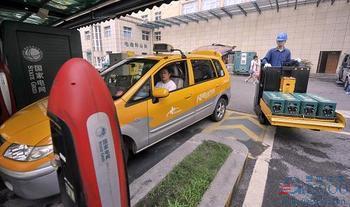BAIC BJEV plans to construct 3,000 optical storage power exchange stations With RMB 10b investments

Shanghai (ZXZC)-BAIC BJEV announces that it will invest about RMB 10b to construct 3,000 optical storage power exchange stations across China and will release 500,000 electric vehicles, which can transfer batteries, to the market with storage power capacity exceeding 5GWH. Besides, BAIC BJEV also held a ceremony, officially delivering 1,000-unit taxis which can transfer the batteries to several companies. More than 3,000 EV taxis which can transfer the batteries have been delivered in total.
The power exchange plan will be implemented in three phases. In the year 2016-2017, 100 power exchange stations will be initially established by BAIC BJEV, Aulton New Energy and taxi companies to form a city-level energy Internet for the operation of more than 4,000 vehicles. The plan will be expanded to cities including Beijing, Xiamen, Guangzhou, Shenzhen, Lanzhou, Xi'an, Kunming and Zhengzhou to establish 1,000 power exchange stations to operate 100,000 vehicles. In the year 2021-2022, BAIC BJEV will establish a nationwide energy Internet centered on optical storage power exchange stations to establish 3,000 stations to operate 500,000 vehicles.
Benefited from the explosive growth of NEV market, two ways of energy supplements for NEV including power charging and power exchange also meet fast growths since the year 2014. Auto companies are setting up charging posts across the nation, represented by Tesla and BMW. But charging posts also face several disadvantages including long-time charging and few charging spots. In contrast, power exchange stations are more suitable for car-leasing customers and will bring in more industrial benefits. But till now, no national standards on power charging thresholds such as battery qualities, charging full load requirements have not been put forward yet. In fact, BAIC BJEV has great confidence in future power exchange stations, but it also stresses that national standards should be promoted to win more recognition from consumers.

